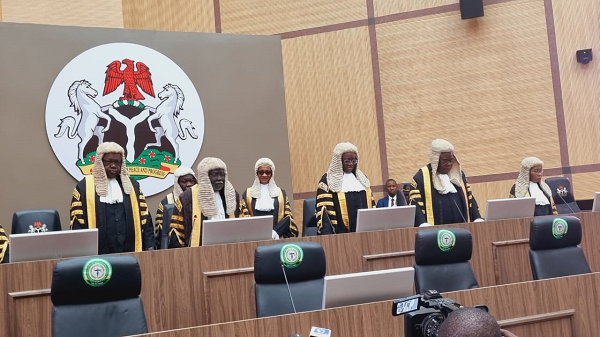File photo of supreme court judges
Ongoing uproar over the legality or otherwise of the Federal Capital Territory (FCT) constructing houses for Judges in Abuja may be a much-needed controversy.
Of the 40 units to be constructed in the Katampe District, 20 will be allocated to the FCT High Court, 10 to the Federal High Court and 10 to the Court of Appeal.
Reports are rife that members of the executives in the FCT and across several states are giving cars and houses to judges without following any constitutional or procedural process and to the detriment of the rule of law and access to justice.
The phenomenon has brought to the fore the parlous conditions of service for even top judicial officers. It highlighted the fact that the staff live in rented accommodation possibly among criminals. It is also possible that the palaver will be resolved by granting the judiciary not only its just desserts but its constitutional autonomy.
Advertisement
Of all the three arms of government, none deserves all the possible perks and privileges of public office as the Judiciary. In Islam, judges are entitled to the best of everything including houses and even spouses.
This is because every serious society demands so much from the sector. The sustainable survival of every state is dependent on the quality of justice it serves. Judges are expected to unfailingly adjudicate with fairness, fair-play, fair-mindedness, equity, equitableness, even-handedness, egalitarianism, impartiality, objectivity, neutrality, disinterestedness, open-mindedness, non-partisanship, honour, uprightness, decency, integrity, probity, honesty, righteousness, ethics, morals, morality, virtue, principle, right-mindedness, propriety, scrupulousness, trustworthiness, incorruptibility, impartialness, absence of bias and lack of prejudice.
The list looks intimidating if not impossible and informs the need for insulating judicial officers from all the known vagaries of life.
Advertisement
So, when the Socio-Economic Rights and Accountability Project (SERAP) urged President Bola Tinubu to stop the minister of the Federal Capital Territory (FCT), Nyesom Wike and 36 governors from usurping the authority and responsibilities of the National Judicial Council (NJC) and heads of court through giving cars and houses to judges, they were quarrelling on the means and not the end.
SERAP said such practices are clearly antithetical to the constitutional principles of separation of powers, checks and balances and the rule of law, and may create the perception that the judiciary is subservient to the executive.
SERAP also urged Tinubu to direct the Attorney General of the Federation and Minister of Justice, Mr Lateef Fagbemi, SAN, as a defender of public interest, to challenge in court the constitutionality and legality of the practices by members of the executive of giving cars and houses to judges in Abuja and across the states.
In the open letter dated November 9, 2024, and signed by SERAP deputy director Kolawole Oluwadare, the organisation said: “Politicians ought to keep their hands off the judiciary and respect and protect its integrity and independence. Politicians must treat judges with dignity and respect.
Advertisement
According to SERAP, “Undermining the fundamental principle of separation of powers risks constraining the ability of the judiciary to act as a check on the executive. SERAP urges you instead to substantially improve funding for the judiciary to enhance their working conditions, welfare and pensions through existing constitutional arrangements and mechanisms.”
Similarly, human rights lawyer, Femi Falana, SAN flayed the construction of houses for judges and justices by the Ministry of the Federal Capital Territory (FCT), saying the action is unconstitutional.
Constitutionally, the funds of the Judiciary every year at the federal level shall pass to the National Judicial Council (NJC). In 2024, what was initially budgeted for the judiciary was N116 billion, but when the National Assembly was convinced on the need for houses and cars for judges, the budget was increased to N345 billion.
The Federal Executive Council and the National Assembly can best enhance the efficiency and effectiveness of the judiciary by considering supplementary budgets for bettering its lousy lot. For the states, the budget of the Judiciary, should be completely under the control of the state judicial service commission.
Advertisement
Building houses and buying cars should be carried out from the budget of the Judiciary. For justice to be done and seen to be done, judges may not accept cars and houses from the executive or legislature who may have cases before them.
Advertisement
Views expressed by contributors are strictly personal and not of TheCable.
Add a comment











